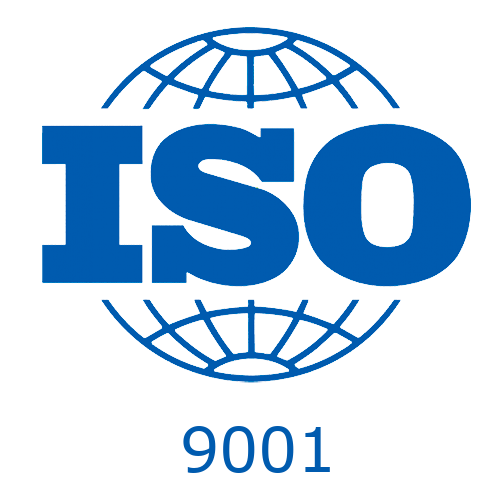
ISO 9001 is an international standard for Quality Management Systems (QMS). It provides a framework for organizations to consistently deliver high-quality products and services, ensuring customer satisfaction and continuous improvement. The standard focuses on meeting customer expectations, regulatory requirements, and enhancing operational efficiency.
Benefits:
- Improved Quality: ISO 9001 helps businesses consistently improve the quality of their products and services.
- Customer Satisfaction: By meeting customer expectations, companies improve trust and loyalty.
- Operational Efficiency: It streamlines processes, reducing inefficiencies and waste.
- Employee Engagement: Employees become more involved in quality control, leading to better morale and performance.
- Global Recognition: ISO 9001 is internationally recognized, enhancing business credibility and competitiveness.
- Regulatory Compliance: Helps meet industry regulations and standards, reducing legal risks.
By adopting ISO 9001, organizations enhance their reputation, reduce costs, and improve overall performance.
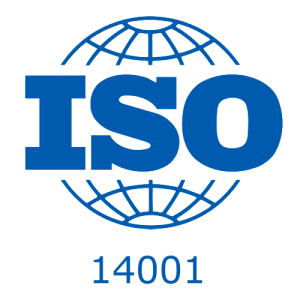
ISO 14001 is an international standard for Environmental Management Systems (EMS). It provides organizations with a framework to manage their environmental responsibilities in a systematic way, helping to reduce their environmental impact and comply with environmental laws and regulations.
Benefits:
- Environmental Impact Reduction: Helps organizations minimize waste, reduce emissions, and use resources more efficiently.
- Cost Savings: By improving efficiency and reducing waste, companies can lower operational costs.
- Regulatory Compliance: Ensures the organization meets environmental laws and regulations, avoiding fines or legal issues.
- Improved Reputation: Enhances the company’s image by demonstrating commitment to sustainability and the environment.
- Market Advantage: Gives businesses a competitive edge, as customers and partners increasingly prefer environmentally responsible companies.
- Risk Management: Identifies and manages environmental risks, reducing the likelihood of accidents or environmental incidents.
By adopting ISO 14001 helps organizations achieve sustainable growth while contributing to environmental protection and better resource management.
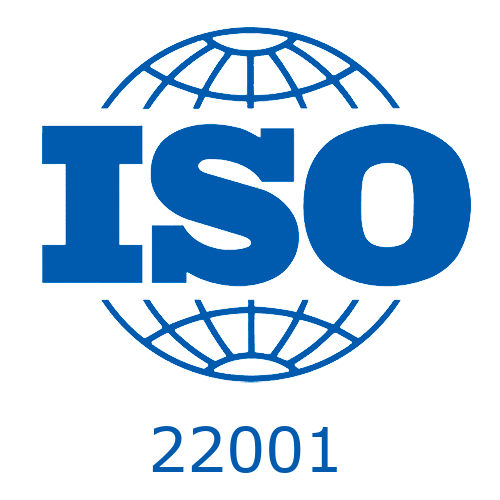
ISO 22000 is an international standard for Food Safety Management Systems (FSMS). It provides a framework for organizations in the food industry to ensure that their products are safe for consumption by controlling food safety hazards throughout the entire food supply chain, from production to consumption.
Benefits:
- Improved Food Safety: Ensures that food products are safe for consumers by identifying and controlling food safety hazards.
- Regulatory Compliance: Helps businesses meet legal and regulatory requirements for food safety, reducing the risk of non-compliance.
- Enhanced Brand Reputation: Demonstrates commitment to food safety and quality, enhancing consumer trust and brand loyalty.
- Risk Management: Proactively identifies and mitigates risks that could affect food safety, preventing potential contamination or health risks.
- Global Recognition: ISO 22000 is internationally recognized, making it easier for companies to trade globally and meet customer expectations.
- Operational Efficiency: Streamlines processes related to food safety management, improving efficiency and reducing waste.
By adopting ISO 22000, organizations can ensure safe food production, increase consumer confidence, and reduce the likelihood of food safety incidents.
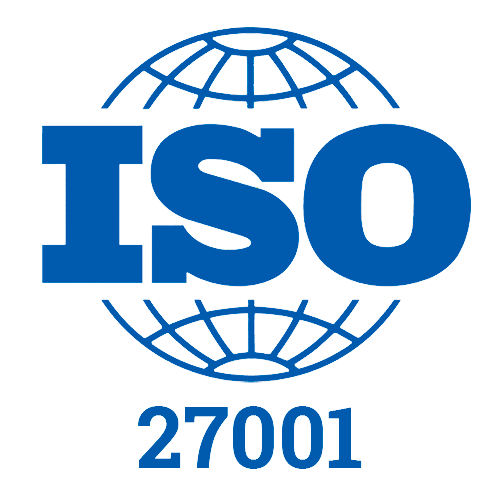
ISO 27001 is an international standard for Information Security Management Systems (ISMS). It provides a framework for organizations to manage sensitive information, ensuring its confidentiality, integrity, and availability. The standard focuses on establishing processes to protect data from threats, both internal and external, and to minimize risks related to information security.
Benefits:
- Improved Information Security: Protects sensitive data from threats like cyberattacks, data breaches, or unauthorized access.
- Risk Management: Helps identify, assess, and manage security risks, reducing potential security incidents.
- Regulatory Compliance: Supports compliance with data protection regulations, such as GDPR, by ensuring robust data security measures are in place.
- Customer Trust: Enhances customer confidence by demonstrating a commitment to protecting their sensitive information.
- Business Continuity: Establishes processes to ensure the organization can continue operating in the event of a security breach or disaster.
- Competitive Advantage: Achieving ISO 27001 certification demonstrates a high level of security, which can give a company a competitive edge in industries where data prote
By adopting ISO 27001, organizations can enhance their information security posture, safeguard sensitive data, and build trust with customers and partners.
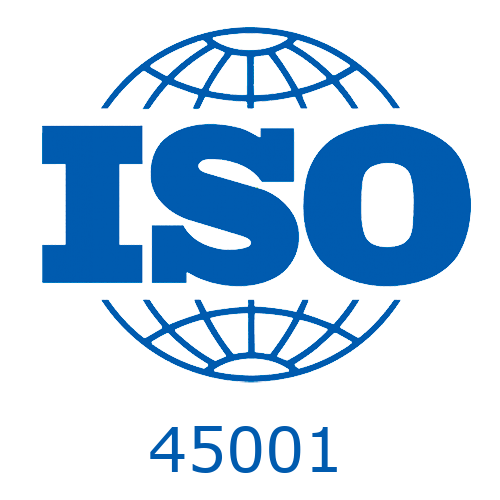
ISO 45001 is an international standard for Occupational Health and Safety (OHS) Management Systems. It provides a framework for organizations to proactively manage health and safety risks, improve employee well-being, and create a safer work environment by reducing workplace hazards and incidents.
Benefits:
- Improved Workplace Safety: Helps identify and control health and safety risks, reducing workplace accidents and injuries.
- Legal Compliance: Supports compliance with local and international health and safety regulations, reducing the risk of legal issues or fines.
- Employee Well-Being: Promotes a culture of health and safety, which leads to improved employee morale, satisfaction, and productivity.
- Risk Management: Identifies potential hazards, evaluates risks, and implements control measures to prevent accidents and incidents.
- Reputation and Credibility: Enhances the organization’s reputation by demonstrating a strong commitment to employee health and safety.
- Operational Efficiency: Streamlines health and safety processes, reducing downtime and improving overall workplace efficiency.
By adopting ISO 45001, organizations can create safer working conditions, reduce risks, and demonstrate their commitment to the health and safety of their employees, leading to a healthier and more productive workforce.
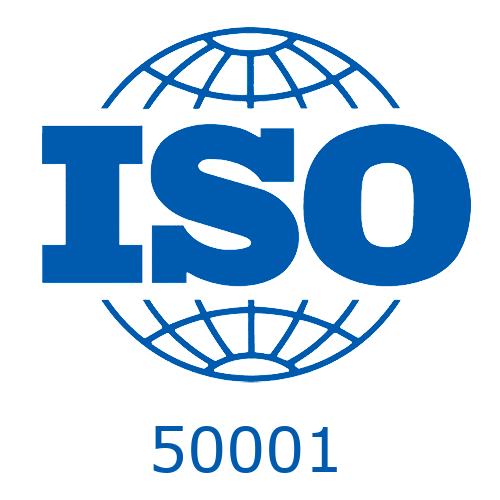
ISO 50001 is an international standard for Energy Management Systems (EnMS). It provides a framework for organizations to improve their energy performance, reduce energy consumption, and enhance energy efficiency. The standard helps businesses manage energy use, minimize environmental impact, and lower operational costs.
Benefits:
- Energy Efficiency: Helps organizations optimize energy use, leading to significant cost savings.
- Reduced Environmental Impact: Contributes to reducing greenhouse gas emissions by lowering energy consumption and waste.
- Cost Savings: Identifies areas of energy inefficiency, allowing organizations to cut energy costs and improve profitability.
- Regulatory Compliance: Helps businesses meet energy-related regulations and standards, reducing the risk of non-compliance.
- Enhanced Reputation: Demonstrates a commitment to sustainability, which can attract environmentally-conscious customers and partners.
- Continuous Improvement: Establishes a systematic approach to continuously monitor, measure, and improve energy performance over time.
By adopting ISO 50001, organizations can drive energy savings, reduce costs, improve sustainability, and contribute to global efforts against climate change.
